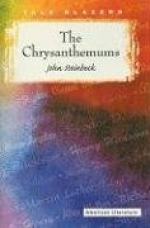|
This section contains 1,919 words (approx. 7 pages at 300 words per page) |

|
SOURCE: “The Lost Dream of Sex and Childbirth in ‘The Chrysanthemums’,” in Modern Fiction Studies, Vol. XI, No. 1, Spring, 1965, pp. 54-8.
In the essay below, Marcus explores the sexual symbolism of “The Chrysanthemums,” concluding that Elisa Allen's frustration results from a longing for childbirth.
I will risk saying that John Steinbeck's “The Chrysanthemums” seems to me one of the world's great short stories, reassured by the fact that though it has received only scattered critical attention, Joseph Warren Beach called its protagonist, Elisa Allen, “one of the most delicious characters ever transferred from life to the pages of a book,”1 and André Gide thought that the story resembles the best of Chekhov.2 The story seems almost perfect in form and style. Its compelling rhythm underlines its suggestiveness, and nothing in the story is false or out of place. Criticism of the story, however, has only vaguely suggested the...
|
This section contains 1,919 words (approx. 7 pages at 300 words per page) |

|


